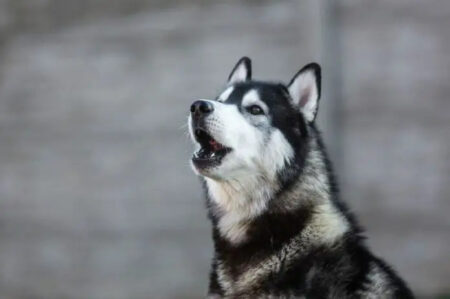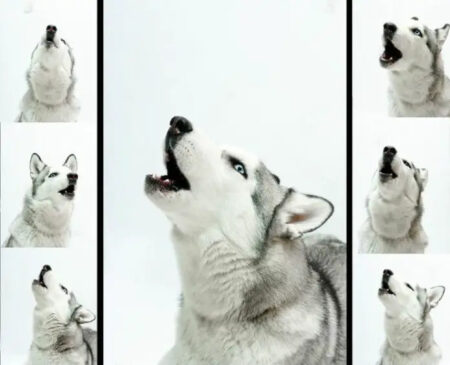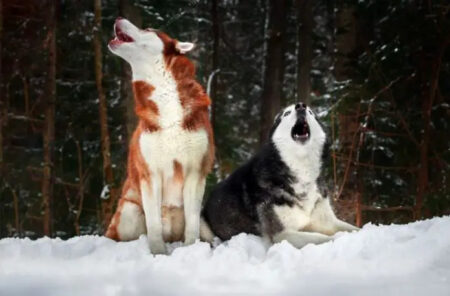Huskies are known for their distinctive howls and vocalizations, often referred to as “screaming.” These unique and loud vocalizations can be alarming to first-time husky owners and passersby alike. But why exactly do huskies scream?
Huskies are a breed of dog known for their strong-willed and independent nature. They have a long history of working as sled dogs in harsh, cold conditions, and their vocalizations were necessary for communication with their human handlers and fellow pack members.
Why Do Huskies Scream?
Huskies are a vocal breed, known for their howling, barking, and even “screaming” behaviors. There are a few reasons why huskies might scream:
Communication:
Like other dogs, huskies use vocalizations to communicate with each other and their owners. Howling and screaming can be a way for them to express their excitement, loneliness, stress, or discomfort.
Expressing Emotions:
Huskies are a highly emotional breed and may express their emotions through “screaming.” They may scream when they are frustrated, anxious, or overwhelmed.
Separation Anxiety:
Huskies can develop separation anxiety when left alone for extended periods. This anxiety can sometimes manifest as screaming, howling, or destructive behavior.
Attention-seeking:
Some huskies may scream to get attention from their owners. This behavior can be reinforced if the owner responds to the screaming, even if it is to scold or comfort the dog.
Herding Instincts:
Huskies were traditionally bred to work in packs and may have retained some herding instincts. Their “screaming” may be a way for them to communicate with the pack or herd.
Physical discomfort:
Some huskies may scream due to physical discomfort or pain. If you notice your husky screaming frequently or in a different way than usual, it’s essential to check for any signs of illness or injury.
Genetic predisposition:
Huskies are descendants of sled dogs, and their ancestors were bred to be vocal. They may have inherited the tendency to “scream” from their ancestors.
Huskies Overview
The Siberian Husky is a beautiful and intelligent dog that is known for its thick, double coat and signature blue eyes. Originating in Siberia, this working dog breed was bred to pull sleds and hunt. They are very active dogs that need plenty of exercise and mental stimulation. Huskies are loyal and affectionate with their families, but they can be independent and stubborn. Because of their high energy and tendency to howl, they may not be the best choice for everyone. But with proper training and socialization, huskies can make wonderful companions.
At What Age Do Huskies Start Howling?
Huskies are known for their distinctive howls, which can start at a very young age. Puppies as young as 8 weeks old may begin to howl, and this behavior typically continues throughout their lives. Husky puppies may howl when they are bored, excited, or feeling stressed.
SEE ALSO: What Can I Give My Dog For Bad Breath?
Why Do Huskies Scream When They See You?
When huskies see their owners after a period of separation, they may express their excitement by screaming or howling. This is often referred to as “Husky Screaming” and is a common behavior for this breed. Huskies are highly social dogs that form strong bonds with their families. When they are reunited with their owners, they may vocalize their happiness and excitement through howling, barking, and jumping. While this behavior can be cute, it can also be a nuisance if it is not properly managed. Training your husky not to scream excessively can help to curb this behavior.
Why Do Huskies Scream Instead of Howl?
There are a few reasons why huskies may scream instead of howl. One reason is that they may be trying to communicate a different message. Howling is generally used to express joy, excitement, or happiness while screaming is often used to express fear, frustration, or pain. Another reason may be that huskies have difficulty producing the low-pitched sounds that are required for howling. Instead, they may produce a higher-pitched sound that resembles screaming.
Why Do Huskies Scream in the Morning?
Huskies may scream in the morning for a variety of reasons. They may be excited to see their owners, or they may be eager to go outside and explore. Additionally, huskies may be trying to communicate their needs, such as hunger or thirst. Some huskies may also simply be trying to get attention from their owners.
What Are The Different Types of Screams?
There is no definitive list of all the different types of screams that huskies can make, but here are some common ones:
- Excited scream: This is a high-pitched, energetic scream that huskies make when they are really happy and excited. You will often hear this type of scream when you come home from work or when you are about to take your husky for a walk.
- Playful scream: Similar to the excited scream, this type of scream is usually accompanied by playful behavior. Your husky may make this sound while playing with you or with other dogs.
- Scream of frustration: Sometimes, when huskies don’t get their way or are unable to do something they want to do, they may let out a loud, frustrated scream. This can also happen during training if your husky is having difficulty understanding a command.
- Howl: Huskies are known for their howling, which is a long, drawn-out sound that can vary in pitch. They may howl to communicate with other dogs, to express their emotions, or simply because it’s in their nature to do so.
- Whimper: This is a soft, high-pitched sound that huskies may make when they are feeling anxious or afraid. It can be a sign of discomfort or fear, so it’s important to pay attention to your husky’s body language when they make this sound.
- Injured scream: If your husky is in pain or has injured themselves, they may let out a loud, high-pitched scream. This can be a sign that they need immediate medical attention, so it’s important to take them to the vet if this happens.
- Attention-seeking scream: Some huskies may use screaming as a way to get attention from their owners. If your husky is not getting enough exercise or mental stimulation, they may resort to this type of behavior to communicate their needs to you.
How to Differentiate Between a Husky Howl and Scream
Differentiating between a husky howl and a scream can be difficult, as the two sounds are quite similar. However, there are a few key differences that you can look for. Howls are generally longer and lower-pitched than screams. They may also have a more melodic quality. On the other hand, screams are shorter and higher-pitched and may have a harsh or abrupt sound. In addition, howls are generally used to communicate with other huskies, while screams are typically used to communicate with people.
When Husky Screaming Is a Concern
While huskies are known for being vocal dogs, there are times when their screaming may be a cause for concern. If your husky is screaming excessively, or if the screams seem more like cries of pain or distress, it’s important to consult with a veterinarian. Additionally, if your husky is screaming at night or in the early morning hours, it could be a sign of separation anxiety or another underlying issue.
How Can I Stop My Husky From Screaming?
There are a few things you can do to help your husky stop screaming. First, make sure your husky is getting enough exercise. A tired husky is less likely to be vocal. Second, try to provide plenty of mental stimulation, such as puzzle toys or training sessions. This will help to keep your husky’s mind occupied and prevent boredom. Finally, try to avoid reinforcing your husky’s screaming behavior by ignoring it. If your husky starts to scream, simply turn away and don’t give them any attention. This will teach them that screaming doesn’t get them the attention they want.
SEE ALSO: My Cat Has Worms How Do I Clean My House?
FAQs
Q. Why are Huskies so vocal?
A. Huskies are very vocal dogs because they were bred to be working dogs in cold climates. Their ancestors, the Siberian Huskies, were used to pulling sleds and communicating with each other over long distances. This means that they evolved to be very loud and have a unique vocal range.
Q. Why do Huskies yell instead of bark?
A. Huskies don’t bark as often as other breeds of dogs because they were bred to be working dogs, not guard dogs. Instead of barking, they use a unique vocalization called “wooing” to communicate. Wooing is a high-pitched, howling-like sound that huskies use to express excitement, frustration, or to get attention. So, when a husky yells, it’s their way of expressing themselves and communicating with their human family.
Q. How do I get my husky to stop screaming?
A. The best way to get your husky to stop screaming is to understand why they’re doing it in the first place. Is your husky bored, anxious, or simply looking for attention? Once you understand the root cause, you can take steps to address it. For example, if your husky is bored, provide them with more exercise and mental stimulation. If they’re anxious, work on desensitization and counter-conditioning. And if they’re just looking for attention, make sure you’re giving them enough of it.
Q. Why are Huskies so dramatic?
A. Huskies are often described as being “dramatic” because they’re known for their expressive personalities. They’re talkative, affectionate, and highly intelligent, which can lead to some exaggerated reactions.
Conclusion
In summary, huskies are known for their vocal nature and may resort to screaming for a variety of reasons. These include excitement, attention-seeking, anxiety, boredom, frustration, and trying to communicate with other dogs. As a breed, huskies have a strong desire to be heard and understood, and screaming is their way of expressing themselves. Husky owners need to understand the reasons behind their dog’s screaming and address any underlying issues to ensure their husky’s well-being and a harmonious relationship. Positive reinforcement training and providing mental and physical stimulation can also help decrease the frequency of husky screams. Overall, huskies are unique and expressive creatures that should be appreciated and understood for their distinctive vocal behavior


